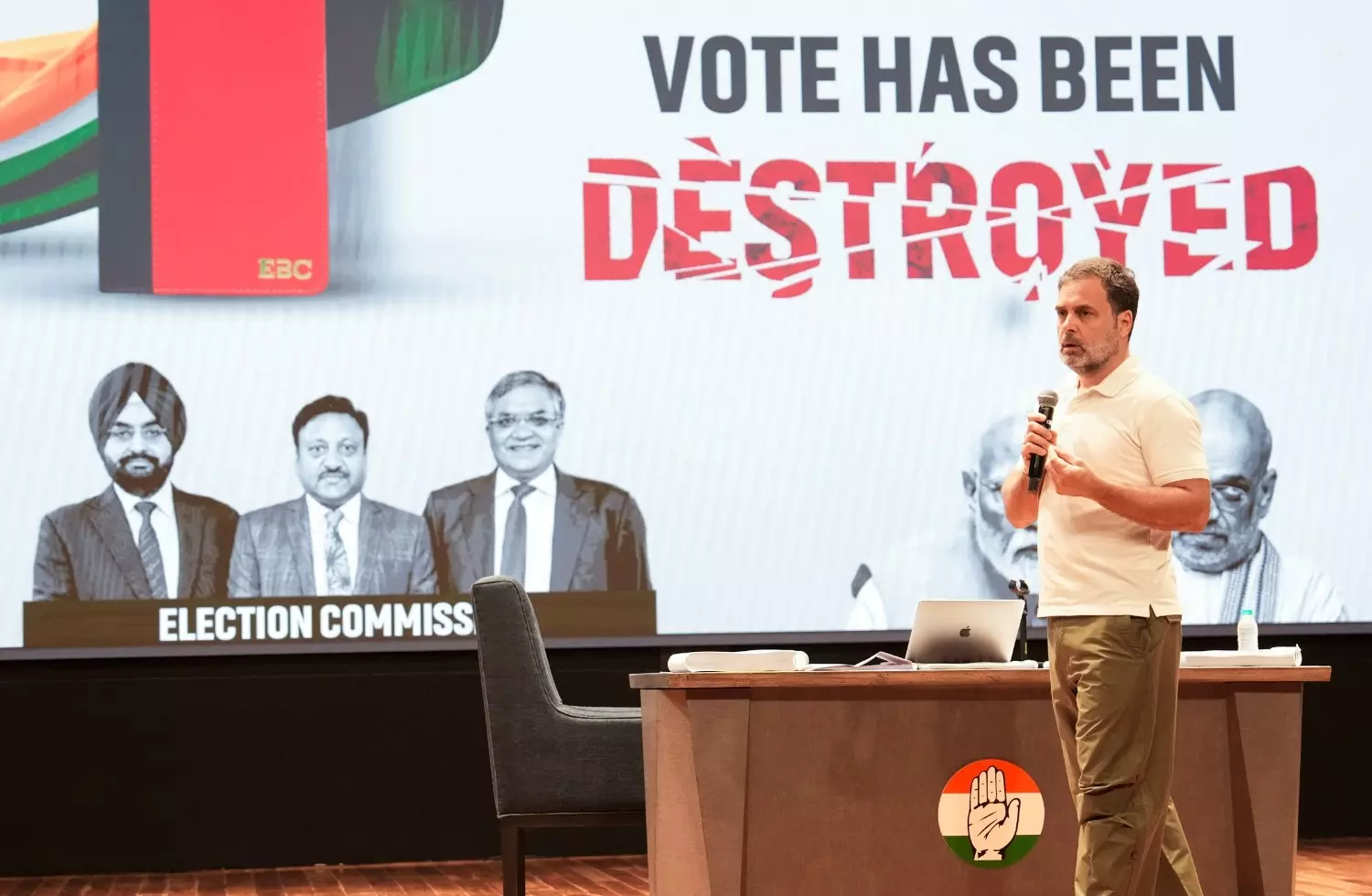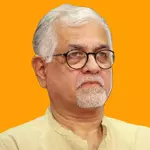
- Home
- India
- World
- Premium
- THE FEDERAL SPECIAL
- Analysis
- States
- Perspective
- Videos
- Sports
- Education
- Entertainment
- Elections
- Features
- Health
- Business
- Series
- In memoriam: Sheikh Mujibur Rahman
- Bishnoi's Men
- NEET TANGLE
- Economy Series
- Earth Day
- Kashmir’s Frozen Turbulence
- India@75
- The legend of Ramjanmabhoomi
- Liberalisation@30
- How to tame a dragon
- Celebrating biodiversity
- Farm Matters
- 50 days of solitude
- Bringing Migrants Home
- Budget 2020
- Jharkhand Votes
- The Federal Investigates
- The Federal Impact
- Vanishing Sand
- Gandhi @ 150
- Andhra Today
- Field report
- Operation Gulmarg
- Pandemic @1 Mn in India
- The Federal Year-End
- The Zero Year
- Science
- Brand studio
- Newsletter
- Elections 2024
- Events
- Home
- IndiaIndia
- World
- Analysis
- StatesStates
- PerspectivePerspective
- VideosVideos
- Sports
- Education
- Entertainment
- ElectionsElections
- Features
- Health
- BusinessBusiness
- Premium
- Loading...
Premium - Events

The Congress leader's explosive allegations challenge EC’s credibility, question SC’s silence, and underscore the Leader of Opposition's vital role in safeguarding democratic integrity
In what could prove to be the most momentous public press conference in recent times, Rahul Gandhi, the Leader of the Opposition in the Lok Sabha, last week presented evidence of massive electoral roll manipulation, which he claims played a significant role in the BJP’s victory in the Bengaluru Central constituency during the 2024 Lok Sabha elections in Karnataka.
Also read | Rahul says fight is for ‘one man, one vote’ as police detain him during SIR protest
While the Congress won seven of the eight Assembly segments in the Bengaluru Central Lok Sabha constituency, it lost in the Mahadevapura segment by over 1,14,000 votes. Citing analysis of hard-copy voter lists provided by the Election Commission, Rahul claimed that 1,00,250 fake votes were added through five fraudulent methods: duplicate voters, voters with fake addresses, bulk or single-address voters, voters with invalid photographs, and non-existent new voters. According to him, this amounted to an “election stolen” through voter list fraud, as part of a coordinated plan to give the BJP an unfair advantage in marginal constituencies across the country.
EC rejects allegations
The Election Commission rejected the allegations as baseless and a repetition of previously debunked claims. It demanded that Rahul either submit a formal, sworn complaint under the proper procedure or apologise to the nation. Subsequently, the Chief Electoral Officers (CEOs) of three states, Karnataka, Maharashtra and Haryana, have also written to Rahul, asking him to submit an official complaint, under oath, in accordance with Rule 20(3)(b) of the Registration of Electors Rules, 1960, to enable an official inquiry into the allegations.
Rahul refused to take a fresh oath, arguing that the voter data belongs to the Election Commission and that the burden of proof lies with them, not him. He also noted that he has already sworn an oath in Parliament to uphold the Constitution. At the same time, experts have pointed out that the EC’s demand is not maintainable because Rule 20(3)(b) refers to claims and objections that are raised after the preparation of the draft electoral rolls following a revision, which are to be done within a 30-day period after the draft roll is finalised. The EC’s blanket refusal to initiate even a preliminary probe, coupled with its readiness to shift the burden entirely onto Rahul, has only reinforced long-standing suspicions among many that the poll panel is neither neutral nor transparent.
LoP’s statutory standing
In the light of this unfolding drama, two major questions emerge. The first is whether a distinction needs to be drawn between Rahul Gandhi, the citizen and politician, and Rahul Gandhi, the Leader of the Opposition, and whether the EC can treat the Leader of the Opposition with the kind of disdain that it has.
Who is the Leader of the Opposition, and what is his role in the democratic process and the functioning of the state machinery in India? The Leader of the Opposition, according to the Act of 1977, is the parliamentary chairperson of the largest political party not in government in either the Lok Sabha or the Rajya Sabha, and is officially recognised as such by the Speaker of the Lok Sabha or the Chairman of the Rajya Sabha, respectively.
In other words, he is a statutory authority with the status of a Cabinet Minister and ranks seventh in the Order of Precedence of the Indian State. The LoP is a member of the selection committees for the Director of the CBI, the Director of Enforcement, the Chairperson and members of the National Human Rights Commission, the Chairperson of the Lokpal, and the audit and expenditure committees of the government.
Also read | Rahul Gandhi’s '80 voters in one house' claim: What we found in Mahadevapura I Fact-Check
Most importantly, he serves on the Selection Committee for the Chief Election Commissioner and Election Commissioners. Whether the LoP will have any real say in these appointments is another matter, especially after a 2023 Bill reconstituted the three-member panel headed by the prime minister, replacing the Chief Justice of India with a Union cabinet minister. Nevertheless, in principle, the EC remains accountable to the LoP by virtue of his role in the committee that appointed them.
Shadow Prime Minister
Significantly, an official Parliament of India booklet published in 2012 notes that the Leader of the Opposition in the Lok Sabha is regarded as a “shadow Prime Minister,” heading a “shadow Cabinet” prepared to assume administration if the government resigns or loses a vote on the floor of the House. In accordance with democratic practice the world over, the LoP plays a significant role in the parliamentary system. This includes providing constructive criticism of government policies, decisions, and actions; ensuring accountability and transparency in governance; offering alternative policies and perspectives; maintaining the checks and balances in the parliamentary system; ensuring a robust democratic discourse; influencing the legislative agenda and shaping public opinion through his/her speeches and interventions, etc.
Though the ruling party, with its tenuous adherence to democratic norms, may prefer to portray all criticism of itself and its policies as anti-national or “echoing the voice of Pakistan,” the fact remains that the LoP’s role is crucial in a parliamentary democracy. When the LoP publicly presents evidence of electoral roll manipulation, it is imperative for the Election Commission, as the constitutional custodian of free and fair polls, to act on it immediately rather than deflect with weak legalistic arguments. However, that looks like a distant dream in the current compromised system.
Justice on hold
This is where a second major question arises: if the Election Commission is reluctant to act and appears intent on obfuscating the matter for reasons obvious to most, why is the Supreme Court not taking suo motu cognisance of the matter? In recent years, the court has done so on several occasions when issues of national importance have arisen.
Worth mentioning are the apex court’s interventions during the COVID-19 pandemic to ensure proper treatment of patients and dignified handling of bodies in hospitals, as well as its monitoring of the distribution of essential supplies and services. Other notable actions include steps to control environmental degradation, suo motu cognisance of sexual violence in the Manipur conflict and the RG Kar Hospital rape and murder case, and directions to address inadequacies in criminal trials, among others.
Defining moment
The issue of electoral roll manipulation and “stolen elections” is arguably the most pressing challenge facing the nation today, for it strikes at the heart of the genuineness and survival of our democratic system. Such systemic concerns fall squarely within the purview of the Supreme Court, because without a fair democratic process to sustain it, law, order, and even the Constitution lose their meaning. The judicial system itself derives its legitimacy from democracy. One can only hope that the venerable judges of the apex court will recognise this urgency and rise to their role as guardians of democracy. That would be a proud moment not just for the nation, but for the very principle of democracy itself.
Also read | 'SC intervention must to goad EC to act on Rahul's vote theft charges' | Capital Beat
If doubts still linger, given the might of the ruling dispensation, they may recall the story of Thomas Becket, a most loyal Lord Chancellor to King Henry VIII of England, who was elevated to Archbishop of Canterbury, primarily to carry out the devious wishes of the monarch. However, once he assumed the post, Becket refused to bend to the king’s wishes and steadfastly upheld the laws and canons of the Church, seeing it as the sacred duty of a shepherd to his flock. What followed is a tragic history: Becket was murdered by the king’s henchmen. He knew what awaited him, yet chose martyrdom over servility, for in the former lies honour, and in the latter, only shame.
Also Read: Vote theft controversy: Why the Supreme Court must step in
(The Federal seeks to present views and opinions from all sides of the spectrum. The information, ideas or opinions in the articles are of the author and do not necessarily reflect the views of The Federal.)


